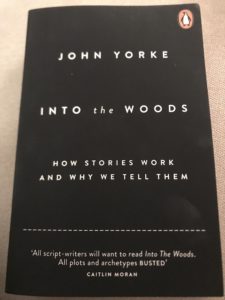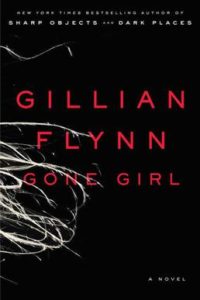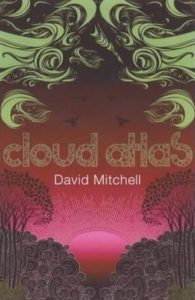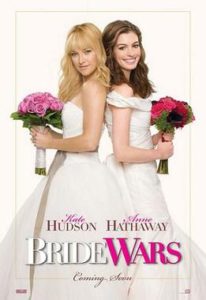 I’m currently reading Into The Woods by John Yorke, which (as you may know) is about stories and storytelling. Unsurprisingly, it features quite a bit of discussion of structure, which is a subject I’ve been thinking about quite a lot recently, and in the spirit of self-indulgent sharing, it’s the springboard for this blogpost.
I’m currently reading Into The Woods by John Yorke, which (as you may know) is about stories and storytelling. Unsurprisingly, it features quite a bit of discussion of structure, which is a subject I’ve been thinking about quite a lot recently, and in the spirit of self-indulgent sharing, it’s the springboard for this blogpost.
Cards on the (perfectly square and clean-baized) table: I like structure. And I like it both as a reader and as a writer. As I’ve written before, my tiny mind was happily bent out of shape many years ago when I started reading and watching things that played with form and chronology and the like, and I still delight to this day in works which don’t draw a straight line from “Once upon a time…” to “… happily ever after” (provided it’s in service of the story; if it’s just done for its own sake, I may wonder if there’s some shortcoming in the story which is being disguised by shuffling the chronology or whatever – and I’d go so far as to suggest that might well be the case with my own first published work. But I digress, and this parenthesis is getting unworkably long, so I’ll close it and then put a full stop and we can move onto a new paragraph).
 Maybe I’m being optimistic, but I think there’s been a bit of a rise of narratives with unusual structure over the past few years – to give a couple of examples,the success of Gone Girl in both written and filmed form was testimony to audiences’ willingness to watch events play out of sequence, and complex structure was a key aspect of Steven Moffatt’s work on Doctor Who (though he doesn’t need time travel as a plot device to enable this kind of thing, as fans of his earlier work Coupling [and I am one of those fans] will be aware). There are often suggestions that audiences are becoming increasingly sophisticated and aware of how narrative works, and I guess that willingness to accept breaking and bending of the A to B shape of a tale may well be a part of that.
Maybe I’m being optimistic, but I think there’s been a bit of a rise of narratives with unusual structure over the past few years – to give a couple of examples,the success of Gone Girl in both written and filmed form was testimony to audiences’ willingness to watch events play out of sequence, and complex structure was a key aspect of Steven Moffatt’s work on Doctor Who (though he doesn’t need time travel as a plot device to enable this kind of thing, as fans of his earlier work Coupling [and I am one of those fans] will be aware). There are often suggestions that audiences are becoming increasingly sophisticated and aware of how narrative works, and I guess that willingness to accept breaking and bending of the A to B shape of a tale may well be a part of that.
 But whether it’s part of a wider phenomenon or not, I’ve long been a fan of structure; as a reader, once I recognise it, I find it reassuring (and in the case of Cloud Atlas, it took me until the midpoint of the book to realise what the author was doing, but when the penny dropped, it did so in a very satisfying way), and as a writer – you knew I’d get to this eventually – I find it very useful.
But whether it’s part of a wider phenomenon or not, I’ve long been a fan of structure; as a reader, once I recognise it, I find it reassuring (and in the case of Cloud Atlas, it took me until the midpoint of the book to realise what the author was doing, but when the penny dropped, it did so in a very satisfying way), and as a writer – you knew I’d get to this eventually – I find it very useful.
I’m a plotter, through and through, and like to have a pretty firm grasp on where the story’s going before I set down even the first line; I’m not one of those people who conjure up characters and then set them off into the environment of the story and see what happens – as novelist Sarah Perry says at about 2m38s in this podcast…
… the characters are plot devices; they’re adrift in the sea of the story, and they can no more shape the tides than you or I can.
 And from a writing standpoint – and especially working, as I do, in the crime/thriller genre where plot is key – there’s something very useful about having a structure to work to; that might be a simple three or even five act structure, it might simply mean having the story starting and ending at the same place or in a similar way to hint at some idea of symmetry, or whatever, but if you have a structure sorted out ahead of time that lets you know what you should be writing about next, then that’s very useful indeed.
And from a writing standpoint – and especially working, as I do, in the crime/thriller genre where plot is key – there’s something very useful about having a structure to work to; that might be a simple three or even five act structure, it might simply mean having the story starting and ending at the same place or in a similar way to hint at some idea of symmetry, or whatever, but if you have a structure sorted out ahead of time that lets you know what you should be writing about next, then that’s very useful indeed.
My most recent completed novel, Captives, was very deliberately structured from the outset of the writing process, because I knew that I wanted to have an investigation taking place in the present day, but I also wanted to detail the events which led up to the start of the story, to give a sense of what the stakes were and of the players involved. Rather than do this through infodumps disguised as dialogue or anything like that, I opted to alternate sequences set in the present with flashback chapters which grew progressively closer to the inciting incident which happens a couple of hours before the start of the first chapter; once I’d cracked that approach, it made things a lot easier – though I still regret the fact that as I counted down from ‘Twelve years before’ to ‘one day before’, I couldn’t make the time-jumps involved align with a reversed version of the Fibonacci Sequence… though given how pretentious that sentence looks when typed out, maybe that’s for the best.
So, as you can imagine, I was keen to see if I could take the same approach with the next novel (working title: Refuge). Once I’d had the characters sketched out, and the sequence of events worked out, I wondered if it would be possible to create a structure which would serve the story – as the book’s about a kidnapping, I wondered if I might be able to rotate the narrative point of view so that we’d hear from The Detective, then The Kidnappers, and then The Kidnappee, before rotating back to the Detective again. I’m particularly keen to make sure we spend as much time as possible with the Kidnappee, as it often feels that people in such stories run the risk of being little more than a MacGuffin, or ‘item’ to be retrieved, and I wanted to avoid that.
However – and you’ve probably already spotted this – the problem with this idea is that (non-spoiler alert) the kidnappers and the kidnappee unsurprisingly spend a lot of time in the same locale, so whilst I could convey a fair amount of detail on events by jumping from our detective to the villains, there’s little additional material (save for internal monologue and the like) that would be conveyed by the jumping to the kidnap victim. I’d effectively end up spending 2/3 of the narrative time on the baddies and their environment, which would make it hard to describe what was going on outside of that without the book becoming excessively long.
 However, given that the story is in itself a ‘ticking clock’ tale with a set ending looming on the horizon and moving closer in stages (akin to most films featuring weddings, for example: the wedding is a fixed point in time and everything we see is drawing us closer to that), it did occur to me that having a race against time which is also viewed through the fragmented narrative of rotating POVs would perhaps be too much to put on top – and given that (again, non-spoiler, given the genre expectations) the paths of the Detective and the Kidnappers will inevitably cross, whose narrative section should I include that in? The Detective closing in, or the Villains realising that things aren’t panning out as planned? I wasn’t sure.
However, given that the story is in itself a ‘ticking clock’ tale with a set ending looming on the horizon and moving closer in stages (akin to most films featuring weddings, for example: the wedding is a fixed point in time and everything we see is drawing us closer to that), it did occur to me that having a race against time which is also viewed through the fragmented narrative of rotating POVs would perhaps be too much to put on top – and given that (again, non-spoiler, given the genre expectations) the paths of the Detective and the Kidnappers will inevitably cross, whose narrative section should I include that in? The Detective closing in, or the Villains realising that things aren’t panning out as planned? I wasn’t sure.
Ultimately, I’ve decided to keep it straightforward, shifting scene as required whilst trying to maintain the sense of a countdown, and to find other ways of including the relevant background information and internal monologue of the Kidnappee. We’ll see how it goes – and given how cathartic and therapeutic it’s been (for me, I mean – I’m sure this has been less so for you) to discuss it here, I’ll see about reporting back on how well (or otherwise) it works out.
Given how writing’s an essentially solitary process, and how every 100,000 words is probably more like 300,000 or so re-written and edited and generally switched around in the writing process, talking about it in this way is very probably just an attempt to provide an almost contemporaneous ‘director’s commentary’ during the process of writing it. Which in itself could be distracting – and is often the reason I cite (with varying degrees of truth) for my infrequent blogging.
Thanks for reading this long sprawling post, and if you have any thoughts, insights or tips on structure, or examples of great structures which amplify or serve the story, please do leave a comment below, I’d like to hear other viewpoints on this.
But enough musing and prevarication: back to the actual writing…



 I’m currently reading Into The Woods by John Yorke, which (as you may know) is about stories and storytelling. Unsurprisingly, it features quite a bit of discussion of structure, which is a subject I’ve been thinking about quite a lot recently, and in the spirit of self-indulgent sharing, it’s the springboard for this blogpost.
I’m currently reading Into The Woods by John Yorke, which (as you may know) is about stories and storytelling. Unsurprisingly, it features quite a bit of discussion of structure, which is a subject I’ve been thinking about quite a lot recently, and in the spirit of self-indulgent sharing, it’s the springboard for this blogpost. Maybe I’m being optimistic, but I think there’s been a bit of a rise of narratives with unusual structure over the past few years – to give a couple of examples,the success of Gone Girl in both written and filmed form was testimony to audiences’ willingness to watch events play out of sequence, and complex structure was a key aspect of Steven Moffatt’s work on Doctor Who (though he doesn’t need time travel as a plot device to enable this kind of thing, as fans of his earlier work Coupling [and I am one of those fans] will be aware). There are often suggestions that audiences are becoming increasingly sophisticated and aware of how narrative works, and I guess that willingness to accept breaking and bending of the A to B shape of a tale may well be a part of that.
Maybe I’m being optimistic, but I think there’s been a bit of a rise of narratives with unusual structure over the past few years – to give a couple of examples,the success of Gone Girl in both written and filmed form was testimony to audiences’ willingness to watch events play out of sequence, and complex structure was a key aspect of Steven Moffatt’s work on Doctor Who (though he doesn’t need time travel as a plot device to enable this kind of thing, as fans of his earlier work Coupling [and I am one of those fans] will be aware). There are often suggestions that audiences are becoming increasingly sophisticated and aware of how narrative works, and I guess that willingness to accept breaking and bending of the A to B shape of a tale may well be a part of that. But whether it’s part of a wider phenomenon or not, I’ve long been a fan of structure; as a reader, once I recognise it, I find it reassuring (and in the case of Cloud Atlas, it took me until the midpoint of the book to realise what the author was doing, but when the penny dropped, it did so in a very satisfying way), and as a writer – you knew I’d get to this eventually – I find it very useful.
But whether it’s part of a wider phenomenon or not, I’ve long been a fan of structure; as a reader, once I recognise it, I find it reassuring (and in the case of Cloud Atlas, it took me until the midpoint of the book to realise what the author was doing, but when the penny dropped, it did so in a very satisfying way), and as a writer – you knew I’d get to this eventually – I find it very useful. And from a writing standpoint – and especially working, as I do, in the crime/thriller genre where plot is key – there’s something very useful about having a structure to work to; that might be a simple three or even five act structure, it might simply mean having the story starting and ending at the same place or in a similar way to hint at some idea of symmetry, or whatever, but if you have a structure sorted out ahead of time that lets you know what you should be writing about next, then that’s very useful indeed.
And from a writing standpoint – and especially working, as I do, in the crime/thriller genre where plot is key – there’s something very useful about having a structure to work to; that might be a simple three or even five act structure, it might simply mean having the story starting and ending at the same place or in a similar way to hint at some idea of symmetry, or whatever, but if you have a structure sorted out ahead of time that lets you know what you should be writing about next, then that’s very useful indeed. However, given that the story is in itself a ‘ticking clock’ tale with a set ending looming on the horizon and moving closer in stages (akin to most films featuring weddings, for example: the wedding is a fixed point in time and everything we see is drawing us closer to that), it did occur to me that having a race against time which is also viewed through the fragmented narrative of rotating POVs would perhaps be too much to put on top – and given that (again, non-spoiler, given the genre expectations) the paths of the Detective and the Kidnappers will inevitably cross, whose narrative section should I include that in? The Detective closing in, or the Villains realising that things aren’t panning out as planned? I wasn’t sure.
However, given that the story is in itself a ‘ticking clock’ tale with a set ending looming on the horizon and moving closer in stages (akin to most films featuring weddings, for example: the wedding is a fixed point in time and everything we see is drawing us closer to that), it did occur to me that having a race against time which is also viewed through the fragmented narrative of rotating POVs would perhaps be too much to put on top – and given that (again, non-spoiler, given the genre expectations) the paths of the Detective and the Kidnappers will inevitably cross, whose narrative section should I include that in? The Detective closing in, or the Villains realising that things aren’t panning out as planned? I wasn’t sure.